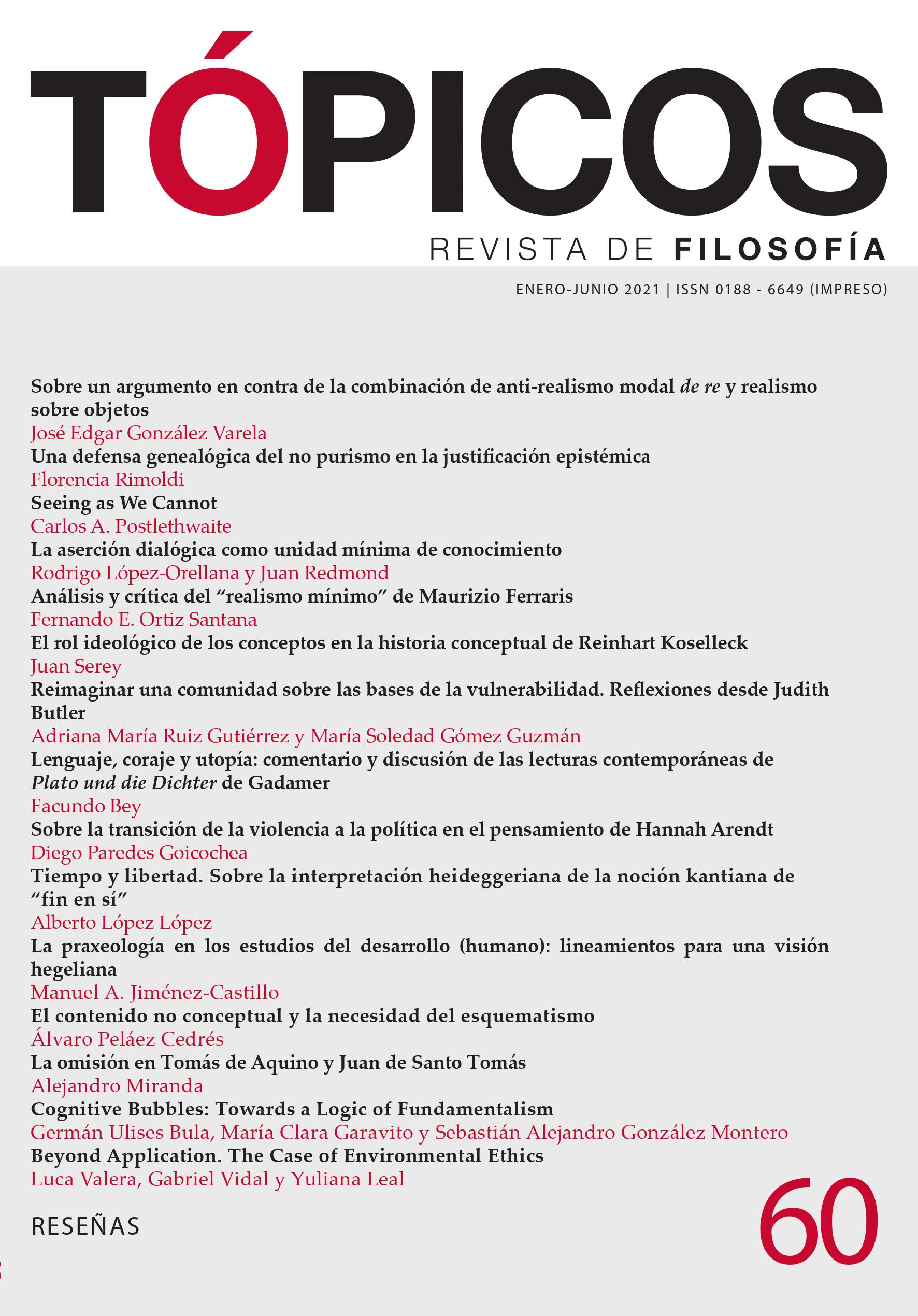Articles
Time and Freedom. On Heidegger’s Interpretation of Kant’s Concept of End in Itself
Published 2020-10-27
Keywords
- Dasein,
- being,
- possibility,
- world,
- selfhood
- temporality,
- freedom,
- decision ...More
How to Cite
López López, A. (2020). Time and Freedom. On Heidegger’s Interpretation of Kant’s Concept of End in Itself. Tópicos, Revista De Filosofía, 60, 293-326. https://doi.org/10.21555/top.v0i60.1154
Abstract
The general aim of the following paper is to show how somefundamental structures that SuZ describes are a reformulation of concepts which can be found in Kant’s practical philosophy. In order to fulfill this aim, Heidegger’s interpretation of Kant´s concept of end in itself is taken as a guiding thread, and I present the sense in which Heidegger appropriates this concept in his theory. Lastly, in the conclusions it is presented how structural features of Dasein’s being could be read according to Kant’s practical philosophy in relation to Heidegger’s appropriation of the previously mentioned Kantian concept.
References
- Callejo Hernanz, M. J. (2017). La unidad absoluta de un fenómeno. Notas sobre la cuestión “destino y carácter” en Platón y Kant. En A. Leyte (ed.), La historia y la nada. 14 ensayos a partir del pensamiento de Felipe Martínez Marzoa. (pp. 149-173). La Oficina.
- Heidegger, M. (1975). Gesamtausgabe. II. Abteilung: Vorlesungen 1919–1944. Band 24. Die Grundprobleme der Phänomenologie. Vittorio Klostermann.
- Heidegger, M. (1976). Gesamtausgabe. I. Abteilung: Veröffentlichte Schriften 1910–1976. Band 9. Wegmarken. Vittorio Klostermann.
- Heidegger, M. (1977). Gesamtausgabe. I. Abteilung: Veröffentlichte Schriften 1910–1976. Band 2. Sein und Zeit. Vittorio Klostermann.
- Heidegger, M. (1978). Gesamtausgabe. II. Abteilung: Vorlesungen 1919–1944. Band 26. Metaphysische Anfangsgründe der Logik im Ausgang von Leibniz. Vittorio Klostermann.
- Heidegger, M. (1991). Gesamtausgabe. I. Abteilung: Veröffentlichte Schriften 1910–1976. Band 3. Kant und das Problem der Methapysik. Vittorio Klostermann.
- Heidegger, M. (2000). Los problemas fundamentales de la fenomenología. Trotta.
- Heidegger, M. (2001). El concepto de tiempo. (Conferencia). J. A. Escudero (trad.). Trotta.
- Heidegger, M. (2004). Gesamtausgabe. III. Abteilung: Unveröffentlichte Abhandlungen. Vorträge – Gedachtes. Band 64. Der Begriff der Zeit. Vittorio Klostermann.
- Heidegger, M. (2007). Hitos. Alianza.
- Heidegger, M. (2008a). El concepto de tiempo. (Curso). J. A. Escudero (trad.). Herder.
- Heidegger, M. (2008b). Principios metafísicos de la lógica. Síntesis.
- Heidegger, M. (2013). Kant y el problema de la metafísica. FCE.
- Heidegger, M. (2014). Ser y Tiempo. Trotta.
- Jiménez Redondo, M. (2013a). El hombre como fin en sí: una aproximación kantiana a la idea de persona. Teoría y Derecho. Revista de pensamiento jurídico, 14, 14-33.
- Jiménez Redondo, M. (2013b). Heidegger sobre el principio moral en Kant. En M. Torrevejano Parra y A. M. Faerna García-Bermejo (eds.), Individuo, identidad e historia. (pp. 191-224). Pre-Textos.
- Kant, I. (1903a) Grundlegung zur Metaphysik der Sitten. En Gesammelte Schriften. I. Abteilung: Werke. Band IV. (pp. 385-464). Georg Reimer.
- Kant, I. (1903b). Kritik der reinen Vernunft (1. Auflage). En Gesammelte Schriften. I. Abteilung: Werke. Band IV. (pp. 1-252). Georg Reimer.
- Kant, I. (1904). Gesammelte Schriften. I. Abteilung: Werke. Band III. Kritik der reinen Vernunft. Zweite Auflage 1787. Georg Reimer.
- Kant, I. (1908). Kritik der praktischen Vernunft. En Gesammelte Schriften. I. Abteilung: Werke. Band V. (pp. 1-164). Georg Reimer.
- Kant, I. (1923). Jäsche Logik. En Gesammelte Schriften. I. Abteilung: Werke. Band IX. (pp. 1- 150). Walter de Gruyter.
- Kant, I. (1942). Welches sind die Fortschritte, die die Metaphysik seit Leibnizens und Wolfs Zeiten in Deutschland gemacht hat? En Gesammelte Schriften. III. Abteilung: Handschriftlicher Nachlaß. Band XX. (pp. 255-332). Walter de Gruyter.
- Kant, I. (2000). Lógica. Akal.
- Kant, I. (2011). Los progresos de la metafísica desde Leibniz y Wolf. Tecnos.
- Kant, I. (2012). Fundamentación para una Metafísica de las Costumbres. Alianza.
- Kant, I. (2013). Crítica de la razón pura. Taurus.
- Kant, I. (2017). Crítica de la razón práctica. Tecnos.
- Martínez Marzoa, F. (2011). Iniciación a la filosofía. ISTMO.
- Navarro Cordón, J. M. (2000). Kant: sendas de la libertad. En J. Echevarría (ed.), Del Renacimiento a la Ilustración II. (pp. 277-308). Trotta-Consejo Superior de Investigaciones Científicas.
- Rodríguez, R. (2004). Del sujeto y la verdad. Síntesis.
- Rodríguez, R. (2015). Fenómeno e Interpretación. Ensayos de fenomenología hermenéutica. Tecnos.
- Rodríguez, R. (2018). Resolución y alteridad: ¿hay una medida en el trato con el otro? Ápeiron: estudios de filosofía, 9, 39-48.
- Vigo, A. (2008). Arqueología y aleteiología y otros estudios heideggerianos. Biblos.
- Vigo, A. (2018). Heidegger, intérprete de Kant. En R. Rodríguez (ed.), Guía Comares de Heidegger. (pp. 359-376). Comares.
- Volpi, F. (2012). Heidegger y Aristóteles. FCE.







